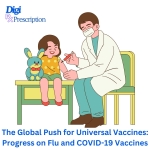Introduction
The search for a universal vaccine that provides long-lasting protection against multiple strains of viruses like influenza and COVID-19 is one of the most ambitious goals in modern medicine. Instead of updating vaccines every year, a universal vaccine could offer broader immunity, reducing the need for frequent booster shots.
In this blog, we’ll explore the latest advancements in universal flu and COVID-19 vaccines, their potential impact on global health, and the challenges researchers face in making them a reality.
1. What is a Universal Vaccine?
A universal vaccine is designed to provide broad and long-lasting protection against multiple variants and subtypes of a virus. Unlike seasonal flu vaccines or COVID-19 boosters, which require regular updates, a universal vaccine would:
✅ Target core viral structures that don’t change over time.
✅ Provide long-term immunity with fewer booster shots.
✅ Protect against new variants before they emerge.
✅ Improve pandemic preparedness by reducing vaccine development time.
2. Universal Flu Vaccine: How Close Are We?
Why Do We Need a Universal Flu Vaccine?
Influenza viruses constantly mutate, requiring new vaccines every year. The current flu vaccines are only 40-60?fective, and mismatches between circulating strains and vaccine predictions can lead to lower protection rates.
Recent Advancements in Universal Flu Vaccines
???? NIH’s mRNA-Based Universal Flu Vaccine
- The National Institutes of Health (NIH) is developing an mRNA-based flu vaccine that targets multiple flu strains at once.
- Early trials suggest it triggers stronger and longer-lasting immune responses than traditional flu shots.
???? Broad-Spectrum Antibody Research
- Scientists at Mount Sinai School of Medicine have identified antibodies that neutralize multiple flu strains, paving the way for a universal vaccine.
???? Nanoparticle-Based Flu Vaccines
- Researchers at the University of Washington have created a self-assembling nanoparticle vaccine that targets conserved flu proteins, making it effective against multiple strains.
- Early trials in 2024 showed promising results in both animals and humans.
3. Universal COVID-19 Vaccine: The Next Frontier
Why Do We Need a Universal COVID-19 Vaccine?
New COVID-19 variants continue to emerge, reducing the effectiveness of current vaccines and requiring frequent booster shots. A universal COVID-19 vaccine would:
✅ Protect against current and future variants (Omicron, Delta, and beyond).
✅ Reduce the need for constant booster doses.
✅ Offer global protection and reduce vaccine inequality.
Latest Developments in Universal COVID-19 Vaccines
???? Pan-Coronavirus mRNA Vaccine (NIH & Moderna)
- Scientists are testing mRNA vaccines that target multiple coronaviruses, not just COVID-19.
- The goal is to create a single vaccine that protects against SARS, MERS, COVID-19, and future coronavirus outbreaks.
???? Spike Protein Evolution-Based Vaccines
- Researchers are studying more stable parts of the virus (like the stem of the spike protein) to create a variant-proof vaccine.
- Early trials show this approach reduces the risk of immune escape.
???? Global Vaccine Coalition Efforts
- The Coalition for Epidemic Preparedness Innovations (CEPI) is funding universal vaccine research to ensure equitable access for all countries.
- Several candidates are in clinical trials and could be available within the next 3-5 years.
4. Challenges in Developing Universal Vaccines
???? Virus Mutation Complexity – Influenza and coronaviruses evolve rapidly, making it hard to identify unchanging vaccine targets.
???? Long-Term Efficacy Uncertainty – Researchers must prove universal vaccines provide years of protection, not just short-term immunity.
???? Regulatory Approvals – New vaccine technologies (like mRNA and nanoparticle-based vaccines) require extensive safety testing before approval.
???? Public Trust & Acceptance – Vaccine hesitancy remains a challenge, and educating the public on universal vaccines is crucial.
5. The Future of Universal Vaccines
???? AI & Machine Learning in Vaccine Design – AI is helping scientists predict virus mutations and design vaccines that stay effective longer.
???? mRNA Technology Evolution – Next-gen mRNA vaccines could train the immune system to recognize entire virus families, not just specific strains.
???? One Shot for Multiple Diseases – Future vaccines may combine protection against flu, COVID-19, RSV, and other respiratory viruses in a single dose.
???? Global Pandemic Preparedness – Universal vaccines could be a game-changer for preventing future pandemics, saving millions of lives.
Conclusion
The race to develop universal vaccines for flu and COVID-19 is making exciting progress, with mRNA, nanoparticle, and broad-spectrum antibody technologies leading the way. While challenges remain, the potential benefits—stronger, longer-lasting immunity and global pandemic preparedness—make this research one of the most critical medical advancements of our time.
With ongoing clinical trials and investment from governments and biotech companies, a universal flu or COVID-19 vaccine could become a reality in the next decade, revolutionizing the way we fight infectious diseases.
???? What do you think about universal vaccines? Would you take one if it were available? Share your thoughts in the comments below!
References:
- National Institutes of Health (NIH) – Universal Flu Vaccine Research: www.nih.gov
- Moderna & Pan-Coronavirus Vaccine Trials: www.modernatx.com
- University of Washington – Nanoparticle-Based Flu Vaccine: www.washington.edu
- Coalition for Epidemic Preparedness Innovations (CEPI): www.cepi.net

